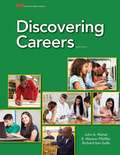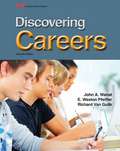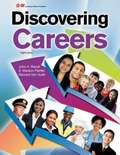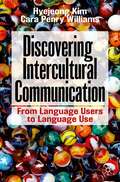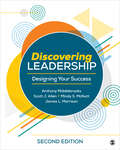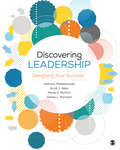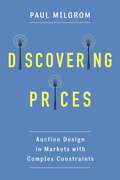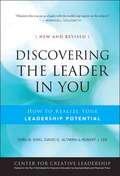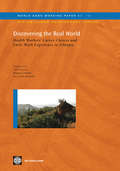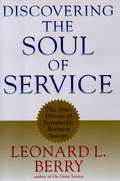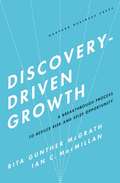- Table View
- List View
Discovering Careers
by John A. Wanat E. Weston Pfeiffer Richard Van GulikDiscovering Careers applies an integrated approach to learning career skills that are vitally important in today's workplace. This comprehensive text provides instruction to introduce students to the skills needed to succeed in school, on the job, and on their own. By studying this text, students will learn skills and techniques that will enable them to prepare for a career and become productive members of the workforce. They will also learn how to be better employees, skilled citizens, and confident contributors to the community.
Discovering Careers
by John A. Wanat E. Weston Pfeiffer Richard Van GulikDiscovering Careers provides students with the opportunity to begin career exploration as young adults. Students will discover their personal goals, interests, and aptitudes as related to career concepts. Technology skills will be developed as well as personal skills, decision-making skills, and employability skills. Discovering Careers challenges students to begin to determine what they want and expect for their future. Opportunities are presented to research careers using the 16 national career clusters, as established by the States' Career Clusters Initiative, to help define future goals. As part of the learning process, awareness will be gained of the educational and training requirements that are needed for various careers and occupations. Traditional careers and nontraditional careers will also be studied. Discovering Careers is the first step toward preparing students to make the most of their study time and learn how to prepare for the future.
Discovering Careers
by John A. Wanat E. Weston Pfeiffer Richard Van GulikDiscovering Careers is designed to introduce students to the skills they will need to succeed in school, on the job, and on their own. By studying this text, students will be able to explore personal goals, interests, and aptitudes that will influence future life decisions. Through exploration of the career clusters and pathways, students will learn about the training and skills required to pursue their post-high school plans. This text helps students take their first steps toward making the most of their education while preparing for the future. - An emphasis is placed on planning a personal program of future study that students can carry into high school and beyond. - Career clusters are featured to provide awareness of the multitude of career choices available after high school. - Cross-curricular opportunities and connections are fostered throughout the text to provide realistic applications
Discovering Intercultural Communication: From Language Users to Language Use
by Hyejeong Kim Cara Penry WilliamsThis textbook provides a succinct, contemporary introduction to intercultural communication with a focus on actual language use. With English as a lingua franca and Communicative Accommodation Theory as the underpinning concepts, it explores communication, language use, and culture in action. Each chapter includes discourse extracts so that students can apply what they have learned to real text examples, and supplementary instructor materials including suggestions for discussion points and activities are hosted on springer.com. The book will be key reading for students taking modules on Intercultural Communication or Language, Culture and Communication as part of a degree in Linguistics and Applied Linguistics, or English Language both at undergraduate and postgraduate level.
Discovering Leadership: Designing Your Success
by Scott J. Allen Mindy S. McNutt James L. Morrison Anthony E. MiddlebrooksPrepare your students to lead the future. Discovering Leadership: Designing Your Success provides a practical, engaging foundation and easy-to-understand framework for individuals to purposefully design leadership. This action-oriented text starts with the self and helps students understand their individual strengths, styles, and skills through numerous reflection opportunities. Next, the text explores the relational aspects of leadership and best practices for motivating and inspiring followers. Finally, the text concludes by examining how leaders can transform their communities and create lasting, positive change. Practical applications and activities in each chapter help students develop their confidence, optimism, resiliency, and engagement. Regardless of your students’ background or major, they will gain the knowledge and skills they need to become thoughtful, impactful leaders.
Discovering Leadership: Designing Your Success
by Scott J. Allen Mindy S. McNutt James L. Morrison Anthony E. MiddlebrooksPrepare your students to lead the future. Discovering Leadership: Designing Your Success provides a practical, engaging foundation and easy-to-understand framework for individuals to purposefully design leadership. This action-oriented text starts with the self and helps students understand their individual strengths, styles, and skills through numerous reflection opportunities. Next, the text explores the relational aspects of leadership and best practices for motivating and inspiring followers. Finally, the text concludes by examining how leaders can transform their communities and create lasting, positive change. Practical applications and activities in each chapter help students develop their confidence, optimism, resiliency, and engagement. Regardless of your students’ background or major, they will gain the knowledge and skills they need to become thoughtful, impactful leaders.
Discovering Leadership: Designing Your Success
by Scott J. Allen Anthony Tony Middlebrooks Mindy S. McNutt James L. MorrisonDiscovering Leadership: Designing Your Success by Anthony Middlebrooks, Scott J. Allen, Mindy McNutt, and James Morrison provides a practical, engaging foundation and easy-to-understand framework for individuals to purposefully design leadership. This action-oriented text starts with the self and helps students understand their individual strengths, styles, and skills with numerous reflection opportunities. Next, the text explores the relational aspects of leadership and best practices for motivating and inspiring followers. Finally, the text concludes by examining how leaders can transform their communities and create lasting, positive change. Practical applications and activities in each chapter help students develop their confidence, optimism, resiliency, and engagement. Regardless of your students’ background or major, they will gain the knowledge and skills they need to become thoughtful, impactful leaders.
Discovering Leadership: Designing Your Success
by Scott J. Allen Anthony Tony Middlebrooks Mindy S. McNutt James L. MorrisonDiscovering Leadership: Designing Your Success by Anthony Middlebrooks, Scott J. Allen, Mindy McNutt, and James Morrison provides a practical, engaging foundation and easy-to-understand framework for individuals to purposefully design leadership. This action-oriented text starts with the self and helps students understand their individual strengths, styles, and skills with numerous reflection opportunities. Next, the text explores the relational aspects of leadership and best practices for motivating and inspiring followers. Finally, the text concludes by examining how leaders can transform their communities and create lasting, positive change. Practical applications and activities in each chapter help students develop their confidence, optimism, resiliency, and engagement. Regardless of your students’ background or major, they will gain the knowledge and skills they need to become thoughtful, impactful leaders.
Discovering New and Emerging Markets
by Clayton M. ChristensenNot only are the market applications for disruptive technologies unknown at the time of their development, they are unknowable. The strategies and plans that managers formulate for confronting disruptive technological change should therefore be plans for learning and discovery rather than for execution. This chapter uses the example of the disk drive industry to show how industry experts can be skilled at forecasting the markets for sustaining technologies but are unable to accurately identify the opportunities for disruptive innovations. This chapter was originally published as chapter 7 of "The Innovator's Dilemma: When New Technologies Cause Great Firms to Fail."
Discovering New Points of Differentiation
by Ian C. Macmillan Rita Gunther McgrathMost profitable strategies are built on differentiation: offering customers something they value that competitors don't have. But most companies concentrate only on their products or services. In fact, a company can differentiate itself at every point where it comes in contact with its customers--from the moment customers realize they need a product to service to the time when they dispose of it. The authors believe that if companies open up their thinking to their customers' entire experience with a product or service--the consumption chain--they can uncover opportunities to position their offerings in ways that neither they nor their competitors thought possible. The authors show how even a mundane product such as candles can be successfully differentiated. By analyzing its customers' experiences and exploring various options, Blyth Industries, for example, has grown from a $2 million U.S. candle manufacturer into a global candle and accessory business with nearly $500 million in sales and a market value of $1.2 billion.
Discovering Prices: Auction Design in Markets with Complex Constraints (Kenneth J. Arrow Lecture Series)
by Paul MilgromTraditional economic theory studies idealized markets in which prices alone can guide efficient allocation, with no need for central organization. Such models build from Adam Smith’s famous concept of an invisible hand, which guides markets and renders regulation or interference largely unnecessary. Yet for many markets, prices alone are not enough to guide feasible and efficient outcomes, and regulation alone is not enough, either. Consider air traffic control at major airports. While prices could encourage airlines to take off and land at less congested times, prices alone do just part of the job; an air traffic control system is still indispensable to avoid disastrous consequences. With just an air traffic controller, however, limited resources can be wasted or poorly used. What’s needed in this and many other real-world cases is an auction system that can effectively reveal prices while still maintaining enough direct control to ensure that complex constraints are satisfied.In Discovering Prices, Paul Milgrom—the world’s most frequently cited academic expert on auction design—describes how auctions can be used to discover prices and guide efficient resource allocations, even when resources are diverse, constraints are critical, and market-clearing prices may not even exist. Economists have long understood that externalities and market power both necessitate market organization. In this book, Milgrom introduces complex constraints as another reason for market design. Both lively and technical, Milgrom roots his new theories in real-world examples (including the ambitious U.S. incentive auction of radio frequencies, whose design he led) and provides economists with crucial new tools for dealing with the world’s growing complex resource-allocation problems.
Discovering the Future: R&D Strategy at Merck
by Gary P. Pisano Kim SlackGiven explosive growth in technologies for drug discovery, how does Merck remain competitive in an industry that is fragmented and continues to consolidate?
Discovering the Leader in You
by Robert J. HerboldPraise for Discovering the Leader in You "An excellent guide for both new and seasoned leaders on the unique and complex challenges of leadership in the twenty-first century. This well-written, concise book will take you through the steps needed to make conscious, deliberate leadership choices in our 24/7 world of constant access and rapid change-choices that will help you better shape and control the influence you want to have. "-Molly Corbett Broad, president, American Council on Education "All great leaders strive for excellence by committing and periodically recommitting to self-improvement. In Discovering the Leader in You, the authors help leaders hone their awareness of self and environment in this must-read guide on the journey to betterment. " -Risa Lavizzo-Mourey, president, Robert Wood Johnson Foundation "An effective leader must have keen self-awareness, which can only be obtained through a systematic process of self-discovery and evaluation. This book will take you through a proven discovery process that will help hone your leadership skills. I highly recommend it. " -Donna Noce, president, White House Black Market "Discovering the Leader in You isn't about finding what's inside you or recovering what you've lost. It's about recognizing your situation, embracing its challenges, and making the necessary changes to overcome the challenges you face. This book helps leaders at all levels frame leadership discovery as a choice-a decision to make a difference to improve the lives of other people. Leadership is essential no matter the situation. " -General James D. Thurman, commanding general, U. S. Army Forces Command "Leaders can make or break an organization. With Discovering the Leader in You, the authors supply us with a systematic approach to excelling as a leader. The principles defined in this book can help you become the effective, impactful leader you want to be!"-Eric Wiseman, chairman, president, and CEO, VF Corporation "Discover who you are as a leader with the world's top experts on the subject!" -Marshall Goldsmith
Discovering the Real World: Health Workers' Career Choices and Early Work Experience in Ethiopia
by Magnus Lindelow Jose Garcia Montalvo Pieter Serneels Danila SerraThis paper presents unique evidence on health workers' career choices in Ethiopia. It shows that challenges like health workers' limited willingness to work in rural areas, as well as their likelihood to migrate abroad vary substantially and are correlated with background, motivation, and job satisfaction. Governments in Africa have identified human resources for health as a priority to improve health outcomes. This study is a valuable resource to better understand health worker choices and help toward the design of more effective human resource policies. This working paper was produced as part of the World Bank's Africa Region Health Systems for Outcomes (HSO) Program. The Program, funded by the World Bank, the Government of Norway, the Government of the United Kingdom and the Global Alliance for Vaccines and Immunization (GAVI), focuses on strengthening health systems in Africa to reach the poor and achieve tangible results related to Health, Nutrition and Population. The main pillars and focus of the program center on knowledge and capacity building related to Human Resources for Health, Health Financing, Pharmaceuticals, Governance and Service Delivery, and Infrastructure and ICT.
Discovering the Soul of Service
by Leonard L. BerryIn a world where customers regard flawless products as a given, service is the key differentiator between competitors in any field. This wise and inspiring book by Leonard Berry, our leading service expert, moves far beyond his pioneering work in services marketing and service quality to explain how great service companies meet their toughest challenge: sustaining long-term success. From Berry's exacting study of fourteen mature, highly successful, labor-intensive companies comes an astonishing revelation: the single most important factor in building a lasting service business is not a matter of savvy business practice, but of humane values. In all fourteen award-winning companies -- Bergstrom Hotels, The Charles Schwab Corporation, Chick-fil-A, The Container Store, Custom Research Inc., Dana Commercial Credit, Dial-A-Mattress, Enterprise Rent-A-Car, Midwest Express Airlines, Miller SQA, Special Expeditions, St. Paul Saints, USAA, and Ukrop's Super Markets -- values-driven leadership connects with strategic focus, executional excellence, control of destiny, trust-based relationships, generosity, investment in employee success, acting small, and brand cultivation to drive customer satisfaction, innovation, and growth. Dedicating a chapter to each of these nine drivers, this book is the most far-reaching and insightful vision ever presented of the principles and step-by-step actions that continuously bring success to life in a company. Berry's comprehensive model reveals the soul that underlies the strategies and day-to-day operations of great service companies, guiding the thousands of daily decisions of individual employees. Clear, compelling, pathbreaking, Discovering the Soul of Service is essential reading for managers everywhere.
Discovering What Has Already Been Discovered: Why Did Your Customers Hire Your Product?
by Clayton M. ChristensenDescribes a methodology for identifying markets for new technologies and for defining the highest value attributes of new products or services. It helps innovators escape the trap of incremental improvements to established product concepts by asking a straightforward question: What job did my customer expect this product to do for him or her?
Discovering Your Career
by Ann K. Jordan Lynne T. WhaleyIn a unique approach to career planning, Discovering Your Career matches a career area to the student rather than the student to a career area. This approach focuses on each student's needs and guides the student to pursuing a career based on individual talents and passions. Discovering Your Career addresses current career trends related to technology, workforce diversity, and global markets; explores investigating careers via job shadowing, service learning, and community mentoring; explains and discusses a variety of career and educational options; and emphasizes self-awareness, goal setting, decision making, reduction of prejudice, SCANS competencies, and economic responsibility. Discovering Your Career also promotes future career success by providing students with current and projected career information and by helping them build skills in such vital areas as networking, teamwork, communication, and problem solving.
Discovery-Driven Growth
by Rita Gunther Mcgrath Ian C. MacmillanYou've been charged with growing your business. Incremental growth can no longer deliver the results you need. You need truly dynamic growth - and you need to achieve it without risking a hugely expensive gamble. How can you encourage innovative new ventures and pursue ambitious growth while minimizing risk?In Discovery-Driven Growth, authors McGrath and MacMillan show how companies can plan and pursue an aggressive growth agenda with confidence. By carefully framing their strategic growth opportunities, testing each project assumption against a series of checkpoints, and creating a culture that acts on evidence and learning instead of blind stumbling, companies can better control their costs, minimize surprises, and know when to disengage from questionable projects--before it's too late.Providing tools that will help you select and better assess the potential of any strategic venture, from new product lines to entirely new businesses, the authors outline a comprehensive process that lets you identify, manage, and leverage your company's full portfolio of opportunities. By reducing up-front costs and eliminating unnecessary risks, you'll be able to avoid missteps and explore more options to create the breakthrough growth that your business requires.
Discovery-Driven Planning
by Ian C. Macmillan Rita Gunther McgrathSmart companies may incur huge losses when they enter unknown territory--new alliances, markets, products, technologies. Failures could be prevented or their cost contained if managers approached innovative ventures with the right planning and control tools. Discovery-driven planning is a practical tool that acknowledges the difference between planning for a new venture and for a more conventional business. Using Kao Corp.'s entry into floppy disks, the authors present a step-by-step approach to help companies think differently about planning. Managers should begin with the bottom line and work their way up the income statement, first determining a new venture's profit potential.
Discovery Limited
by Michael E. Porter Mark R. Kramer Aldo SesiaDiscovery Ltd. is a South-African based insurance company. Started in the early 1990s, Discovery used behavioral economics and data collection to innovate in the health care insurance industry. Its founder Adrian Gore believed that the company's products needed to not only make money but have a positive impact on society. Using its Vitality Wellness program as its strategic lynchpin, Discovery expanded into other insurance areas and financial services products and also entered new markets abroad. In late 2014, Gore and his team had to decide how to further develop the company and prioritize among many growth opportunities.
Discovery Skill #1: Associating-How Making Connections Across Seemingly Unrelated Fields and Disciplines Triggers Your Innovative Powers
by Hal B. Gregersen Jeffrey H. Dyer Clayton M. ChristensenWhen it comes to disruptive innovation, you don't have to start from scratch to create something new. Asking questions and fusing knowledge across disciplines and industries are the keys to improving your aptitude for association, a cognitive skill that lies at the core of innovation. In this chapter, authors Jeff Dyer, Hal Gregersen, and Clayton Christensen teach you how to strengthen your capacity for associating by describing how companies such as Oracle and Starbucks and devices such as the BlackBerry are in fact the products of association. "Defocusing," "Lego thinking," and "curiosity boxes" are just some of the practical strategies and activities designed to help you develop the associating skills that could lead to your own breakthrough innovation. This chapter was originally published as Chapter 2 of "The Innovator's DNA: Mastering the Five Skills of Disruptive Innovators."
Discovery Skill #2: Questioning-How Inquisitive Thinking and Provocative Questions Spark Innovation
by Hal B. Gregersen Jeffrey H. Dyer Clayton M. ChristensenWe tell children that there is no such thing as a dumb question, but so often we keep our ideas and concerns to ourselves, afraid to come across as foolish or disagreeable. But when you stifle your creative imagination, you limit your opportunities for innovation. In this chapter, authors Jeff Dyer, Hal Gregersen, and Clayton Christensen encourage you to channel your inner child and rediscover your spirit of curiosity. They explain how asking different and provocative questions allows you to reframe problems and uncover new and better solutions, and how questioning can be used as the creative catalyst for innovation. Along with techniques like "QuestionStorming," this chapter provides question sequences that promise to launch your inquisitive thinking in a productive direction. By pondering what might be instead of dwelling on what is, you can free yourself from the shackles of routine and stumble upon something altogether novel. This chapter was originally published as Chapter 3 of "The Innovator's DNA: Mastering the Five Skills of Disruptive Innovators."
Discovery Skill #3: Observing-How Watching Your Customers, Other Companies, and the World Around You Can Lead to Game-Changing Innovation
by Hal B. Gregersen Jeffrey H. Dyer Clayton M. ChristensenDelivery-driven leaders often become so consumed by the pressures of running an organization that they never pause to take a look at what's going on around them. But disruptive innovators like Ratan Tata, creator of the Nano car, whose journey of discovery is described in this chapter, are constantly on the lookout for jobs people need to get done and workarounds, or partial solutions, that can be the answers to everyday problems. In this chapter, authors Jeff Dyer, Hal Gregerson, and Clayton Christensen advise you to expand your perspective by using your peripheral vision. They show you how observing your environment can bring great insight. Also in this chapter, they detail three habits that will make you a good observer: 1) Actively watching customers to see what products they "hire" to do what jobs; 2) Learning to look for surprises or anomalies; and 3) Finding opportunities to observe in a new environment. This chapter was originally published as Chapter 4 of "The Innovator's DNA: Mastering the Five Skills of Disruptive Innovators."
Discovery Skill #4: Networking-How Interacting with People Outside Your Social and Professional Spheres Can Jump-Start Innovation
by Hal B. Gregersen Jeffrey H. Dyer Clayton M. ChristensenThinking outside the box is just one component of disruptive innovation. Venturing outside your social circle is equally important. Diversifying your personal and professional contacts will spark an inundation of new knowledge and fresh perspectives that can stimulate innovative ideas. In this chapter, authors Jeff Dyer, Hal Gregerson, and Clayton Christensen elaborate on the benefits of networking with people and companies outside your area of expertise. The chapter is packed with examples of crossovers that have yielded incredible success, like Coca Cola's surprising influence on the design of the BlackBerry. Whether at a formal idea-networking event or a casual backyard barbecue, innovators are always learning from the people around them. Equipped with the tips featured at the end of this chapter, you will be able to instigate new and stimulating social interactions and, in the process, break new ground for your business. This chapter was originally published as Chapter 5 of "The Innovator's DNA: Mastering the Five Skills of Disruptive Innovators."
Discovery Skill #5: Experimenting-How Your Willingness to Try New Things, Take Something Apart, or Build a Prototype Boosts Your Power to Innovate
by Hal B. Gregersen Jeffrey H. Dyer Clayton M. ChristensenForget the lab coat, the Petri dish, and all those hazardous chemicals. Innovators can experiment everywhere, everyday, with whatever materials they have at hand. In this chapter, authors Jeff Dyer, Hal Gregerson, and Clayton Christensen discuss the many forms experimenting can take, from hands-on tinkering to hypothetical musings, and narrow them down to three styles for approaching the process yourself. The best part of this discovery skill is that failure is not an option! Any experiment produces feedback that can lead to today's discovery or be stored for a future innovation. This chapter is filled with stories about the experimental beginnings of companies like Amazon, Dell, and IKEA, plus quantitative data that support the direct link between experimentation and innovation. Taking you from the toy box to the junkyard, this chapter concludes with simple, fun activities that will help you develop the experimental mind-set of an innovator. This chapter was originally published as Chapter 6 of "The Innovator's DNA: Mastering the Five Skills of Disruptive Innovators."
